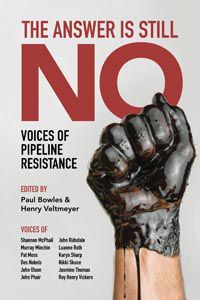Halifax Media Co-op
News from Nova Scotia's Grassroots
Book Review: The Answer is Still No - Voices of Pipeline Resistance
- The Answer is Still No - Voices of Pipeline Resistance
- Paperback ISBN: 9781552666623
- Paperback Price: $22.95 CAD
- Publication Date: Apr 2014
- Rights: World
- Pages: 156
On a recent research-based trip to Northern British Columbia, editors Paul Bowles and Henry Veltmeyer wound up interviewing a dozen strong voices in the battle against Enbridge's proposed 'Northern Gateway' pipeline project. These interviews, from a wide swath of personalities and backgrounds, form the new Fernwood Publishing release: 'The Answer is Still No' – Voices of Pipeline Resistance.
For those involved in struggles against industrial projects, 'The Answer' is a hopeful tome and an invigorating and quick read. Bowles and Veltmeyer cast their net wide and catch a variety of voices, ranging from self-professed cowboys to Indigenous activists on the front lines.
That peoples of such varied and historically conflictual backgrounds could come together in opposition to Enbridge's desires to pipe tar sands' bitumen to the port of Kitimat, speaks volumes about their mutual commitment to defend the lands, waters and animals of one of the colonial Canada's most pristine environments. It also gives the reader hope that true grassroots resistance, even in a sparsely populated area like Northern British Columbia, has the ability to seize the industrial agenda, reformulate it and serve it back to multi-nationals with a firm 'Thanks, but no thanks.'
While not a blueprint, The Answer is also more than a smattering of interviews from larger-than-life 'activists'. These are normal people; you, me and the neighbour. These are not professional trouble makers or environmental terrorists funded by outside sources, as they have been portrayed by the Harper regime.
They did have to make a commitment, however, to put their individual dreams on hold against the impending threat of environmentally destructive development. This means, in many cases, entering the bureaucratic fray of consultation meetings and town halls. This means adopting a variety of time and labour intensive opposition techniques. What it means, in effect, is returning to the paradigm of nation first, whatever that nation might mean to you, and taking on the long-view.
It may be that such commitments are easier made when the land, waters and animals are things you interact with on a daily basis, and the climate is such that you won't make it without help from your neighbours.
It may also be that the call to arms for environmental defence sounds stronger when the environment in question has not repeatedly been treated like a dumping ground for hundreds of years.
Whatever the case, readers of all backgrounds, in Atlantic Canada and beyond, would do well to jump into this staccato-speed read and seek inspiration and techniques from our brothers and sisters on the front lines in Northern BC.
The site for the Halifax local of The Media Co-op has been archived and will no longer be updated. Please visit the main Media Co-op website to learn more about the organization.



